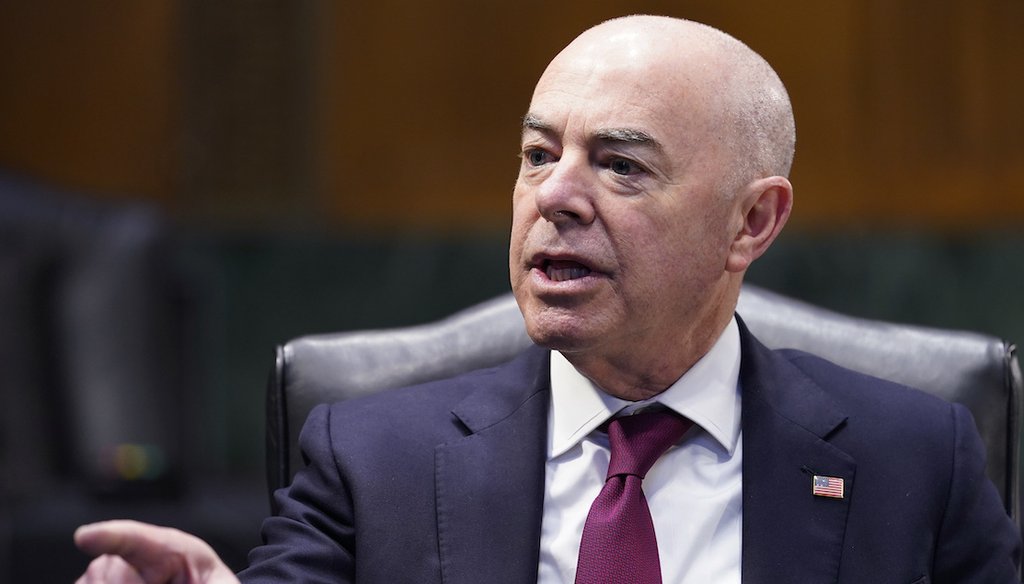Stand up for the facts!
Our only agenda is to publish the truth so you can be an informed participant in democracy.
We need your help.
I would like to contribute

Secretary of Homeland Security Alejandro Mayorkas, speaks during a Senate Appropriations - Subcommittee on Homeland Security hearing, May 4, 2022.
If Your Time is short
-
The Department of Homeland Security’s announcement of a Disinformation Governance Board was met with immediate criticism from some Republican lawmakers questioning the board’s constitutionality and its potential infringement on the First Amendment.
-
DHS says the board is a “working group” that will look for the best ways of tackling disinformation that threatens national security.
-
The responsibility of identifying and responding to disinformation rests with other DHS agencies, while the board will develop “guidelines, standards, guardrails” so that the work the agencies do “does not infringe on people’s free speech rights, rights to privacy, civil rights and civil liberties,” DHS Secretary Alejandro Mayorkas said.
-
Experts say more concrete and clear information about the board is still needed.
The secretary of the U.S. Department of Homeland Security recently spent more than two hours fielding pointed questions from lawmakers about the Biden administration’s management of immigration at the southern border. But what most dominated headlines was his seemingly unplanned announcement of a "Disinformation Governance Board."
The revelation came after Rep. Lauren Underwood, D-Ill., asked Alejandro Mayorkas how DHS is addressing Spanish-language mis- and disinformation.
Mayorkas began his reply saying that DHS is working on the issue and that staff within the department are "leading a just recently constituted misinformation disinformation governance board. The goal is to bring the resources of the department together to address this threat."
Some Republican lawmakers and social media users soon began referring to the board as the Ministry of Truth, a nod to George Orwell’s dystopian novel "1984." Critics questioned the constitutionality of such a group and whether it would infringe on free speech rights protected under the First Amendment.
Mayorkas’ comments during the April 27 House hearing lacked clear information on the purpose of the group.
Days later, during appearances on CNN, Fox News and NBC News, Mayorkas said DHS could have "done a better job of communicating" what the board does and does not do. Nearly a week after Mayorkas announcement, DHS published an official fact sheet detailing the goals of the Disinformation Governance Board.
But much still remains uncertain. For now, here’s what we know and don’t know about this group.
What is the board and what is its goal?
DHS says the Disinformation Governance Board is a "working group" that will look for the best ways of tackling disinformation that threatens national security.
Disinformation is false information created or shared deliberately with the intent to mislead or deceive. DHS singled out foreign states — Russia, China and Iran — and transnational criminal and human smuggling organizations as spreaders of disinformation.
The board will seek to do its job without infringing on Americans' free speech or civil liberties, Mayorkas told Chuck Todd on May 1 on NBC's "Meet The Press."
DHS’ fact sheet said the board will share its information with agencies within the department and release quarterly reports to Congress and oversight committees to "build the trust needed for the department to be effective in this space."
As of May 4, the board had not yet met or began its work, Mayorkas said.
What has DHS done previously on disinformation?
DHS says it already uses publicly available sources, information shared by other federal agencies and research by academic institutions to identify disinformation that could pose a threat to the United States.
DHS agencies, including Customs and Border Protection, the Federal Emergency Management Agency and the Cybersecurity and Infrastructure Security Agency, or CISA, lead initiatives to tackle disinformation, DHS said, citing these examples:
-
CISA, created in 2018, sets out to combat election disinformation from foreign governments;
-
CBP launches media campaigns to share accurate information about U.S. immigration policies as a way to counter the false information spread by cartels; and
-
FEMA corrects false information that spreads during major disasters.
Mayorkas emphasized this work during a May 1 interview with Bret Baier on Fox News.
"I'll give you a real-life example, the cartels spread disinformation that Title 42 does not apply to the Haitians. And that prompts, potentially, Haitians to try to come to the United States. And what do we do? U.S. Customs and Border Protection, phenomenal enforcement agency, goes on Creole language stations and communicates that Title 42 does apply to Haitians."
Title 42 is a public health law that allows border officials to expel certain immigrants arriving at U.S. borders without giving them a chance to apply for asylum.
DHS told PolitiFact that the responsibility of identifying and responding to disinformation would remain with agencies like CBP, FEMA and CISA.
Meanwhile, the board will develop "guidelines, standards, guardrails" so that the work the agencies do "does not infringe on people’s free speech rights, rights to privacy, civil rights and civil liberties," Mayorkas said during a Senate hearing May 4, as lawmakers questioned him even more about the board’s mission.
Who leads the Disinformation Governance Board?
The board is made up of leaders from several agencies within DHS, including the Office for Civil Rights and Civil Liberties. It will be co-chaired by the DHS undersecretary for policy and the principal deputy general counsel, according to Mayorkas.
Nina Jankowitz, the board’s executive director, has come under scrutiny from conservative critics who claim she’s partisan. Critics point to her support for Hillary Clinton during the 2016 campaign and other past comments.
In an April interview with NPR, Jankowicz expressed concern over Elon Musk’s plans to purchase Twitter. She said she was worried about the effect "free-speech absolutists" might have on marginalized communities, whose members often face online abuse.
Since 2017, Jankowicz had been a fellow at the Wilson Center, a nonpartisan policy forum, where she worked on the Science and Technology Innovation Program and the Kennan Institute, which is "committed to improving American understanding of Russia, Ukraine, and the region through research and exchange."
While on a Fulbright-Clinton Public Policy Fellowship, Jankowicz advised the Ukrainian Foreign Ministry on disinformation, her website said. She’s also worked on democracy assistance programs to Russia and Belarus at the National Democratic Institute, a nonprofit organization that works to promote democracy abroad.
Jankowicz has written two books, including one on Russia and disinformation.
Mayorkas has defended Jankowicz’s background and said he does not question Jankowicz’s objectivity.
"There are people in (DHS) who have a diverse range of views, and they're incredibly dedicated to mission. We're not the opinion police," Mayorkas said on Fox News. "She has testified before Congress a number of times, she's recognized as a tremendous authority, and we're very fortunate to have her."
Criticism of the Disinformation Governance Board
Some Republicans, including Sen. Josh Hawley, R-Mo., say that the new board will be "policing Americans’ speech." Sen. Rob Portman, R-Ohio, has also said he’s "deeply concerned" about the board and that DHS’ focus should be on "bad actors like Russia and China, not our own citizens."
I am deeply concerned by the administration’s decision to create a Disinformation Governance Board at the Department of Homeland Security. My full statement: https://t.co/9EkgGCdBXt pic.twitter.com/ACm6TT3wyZ
— Rob Portman (@senrobportman) April 28, 2022
DHS has countered that the board’s focus is not American citizens, but disinformation from foreign actors that pose a security threat to the U.S.
"We in the Department of Homeland Security don't monitor American citizens," Mayorkas told CNN host Dana Bash May 1.
What do disinformation experts say about this new board?
Disinformation experts criticized the DHS rollout of the new board. They said the lack of concrete and clear examples as to what the board will and will not do and what its powers are have left the doors open for speculation and criticism.
Clemson University disinformation professor Darren Linvill says the name hasn’t helped either. He says it "does sound a little ministry of truth-y," especially for a group whose actual power is going to be very limited.
Still, experts we spoke to agreed that some of the criticism the board has received is likely unfounded.
DHS hasn't adequately explained the need for or scope of its eerily named Disinformation Governance Board.
— ACLU (@ACLU) May 6, 2022
We're skeptical of the government arbitrating truth and falsity. How concerned we should be depends on the function and authority of this position. https://t.co/yfZttX2pv5
"The board can’t have real enforcement authority because it would be unconstitutional. The government can’t say to any online entity, that’s not truthful you have to take it down, (because) that would violate the First Amendment," said Ben Wizner, director of the Speech, Privacy, and Technology Project at the American Civil Liberties Union.
But Wizner said the lack of clarity around the board has led to these fears over whether the government will police what is true or false. He says that DHS still hasn’t made a compelling case for why a board of this kind is needed.
Our Sources
Department of Homeland Security, Fact Sheet: DHS Internal Working Group Protects Free Speech and Other Fundamental Rights When Addressing Disinformation That Threatens the Security of the United States, May 2, 2022
CNN, "State of the Union," May 1, 2022
Fox News, "Fox News Sunday," May 1, 2022
NBC, "Meet the Press," May 1, 2022
House Committee on Homeland Security, A Review of the Fiscal Year 2023 Budget Request for the Department of Homeland Security, April 27, 2022
U.S. Senate Committee on Homeland Security and Governmental Affairs, Portman Expresses Concern About Creation of DHS Disinformation Governance Board, April 28, 2022
U.S. Senate Committee on Homeland Security and Governmental Affairs, Committee Hearing: Resources and Authorities Needed to Protect and Secure the Homeland, May 4, 2022
Sen. Josh Hawley R-Mo., Hawley Slams Biden Administration's 'Disinformation Governance Board,' Demands It Be Dissolved, April 28, 2022
Wilson Center, Nina Jankowicz
Nina Jankowicz, tweet, April 27, 2022
Nina Jankowicz, tweet, Feb. 17, 2021
Nina Jankowicz, tweet, Jan. 21, 2021
Nina Jankowicz website, about, accessed May 2, 2022
The Associated Press, "AP Explains: Trump seizes on dubious Biden-Ukraine story," Oct. 14, 2020
New York Post, "Biden ‘disinfo’ czar Nina Jankowicz ripped over cringeworthy Mary Poppins TikTok," April 29, 2022
New York Post, "Biden ‘disinfo’ boss Nina Jankowicz once belted out a raunchy parody Christmas song," April 30, 2022
Fox News, "Tweets from 'disinformation czar' reveal history of dubious claims on COVID, Hunter Biden and Russia," April 29, 2022
Maze, tweet, April 29, 2022
Institute for Security and Technology, YouTube, "LIVE ASK ME ANYTHING featuring Vera Zakem and Nina Jankowicz," May 2020
The New York Times, "Trump’s order targeting social media sites, explained," May 28, 2020
Phone interview, Department of Homeland Security, May 3, 2022
Phone interview with Ben Wizner, director of the ACLU’s Speech, Privacy, and Technology Project, May 6, 2022
Phone interview with Jeff Kosseff, associate professor of cybersecurity law United States Naval Academy’s Cyber Science Department, May 6, 2022
Phone interview with Darren Linvill, associate professor Clemson University, May 6, 2022




























